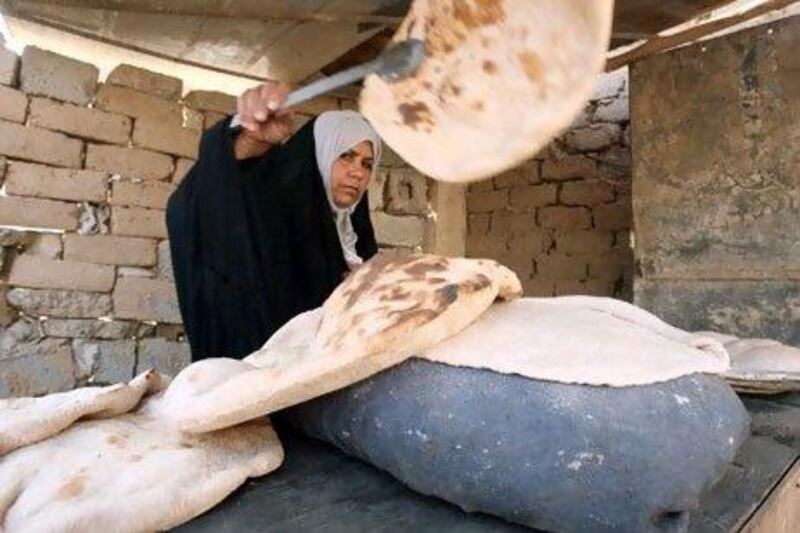The price of flour in Baghdad has tripled in the past two months, forcing the new Iraqi government to scramble to address its potential food security problems.
The issue is a top priority for Iraq, said Ezaldin Dawlat, the minister of agriculture, pointing to a range of initiatives designed to boost the country's food production.
"We're doing research, supporting small projects, providing interest-free loans to farmers and subsidising prices of fertiliser and grains required," he said in Baghdad. "It's better to begin, rather than not do anything at all."
Wheat futures on Thursday surged to their highest point since August 2008, touching US$8.93a bushel, after the US agriculture department cut its outlook for global grain supplies. In Baghdad shops, a 50kg sack of flour which sold at 10,000 Iraqi dinars (Dh31.24) in December now sells for 30,000 dinars, Mr Dawlat said.
_______________________________
Editor's Pick - Egypt looks towards stimulus package
_______________________________
Once known as the breadbasket of the Middle East, Iraq was a key exporter of wheat and barley in the 1980s. Devastated by decades of wars, sanctions and neglect, billions of dollars are spent each year on importing staple products such as wheat, rice and sugar.
"We are trying to support local farmers and build our local produce in light of a global food war," Mr Dawlat said.
The ministry next week is looking to award the first of three tenders announced in November to supply up to 550 irrigation systems as part of its goal to supply water to 1.5 million hectares scattered around the country and produce 3 million tonnes of grain in addition to 3 million tonnes of fodder a year.
The centre pivot irrigation systems to be bought are a water efficient method of crop irrigation. The technology will cost the country up to $33 million (Dh121.2m), of which half will be financed by the ministry, with the other half financed by farmers through interest-free loans.
The ministry had announced recently that it was suspending potato crop imports from this month to April, as domestic production was seen to have already fulfilled the demand in the local market. In addition, Iraq has been constructing hundreds of greenhouses to support the production of vegetables.
_______________________________
Industry Insights - Drought risk to China wheat crop
______________________________
Agriculture is Iraq's second-largest economic sector, accounting for 9.6 per cent of its GDP and employing about 20 per cent of the workforce.
Iraq has a food security issue, not just with grains and basic produce but also fodder for its animals, said David Forshaw, the general manager in Dubai for Valmont Industries, which specialises in centre pivot systems. "They have had to slaughter a number of their animals in past years because they could not feed them," he said.
Mr Forshaw said Iraq already had most of the infrastructure in place to rebuild the agriculture sector, but many of the irrigation systems supplied to the country during the 24-year Saddam Hussein regime needed to be refurbished.
The US agriculture department last June organised its first agribusiness trade mission to Baghdad. Representatives of 17 US companies met more than 100 Iraqi entrepreneurs and buyers to increase US agricultural exports, promote joint ventures and to boost investment in Iraq's developing agricultural sector. The US companies met face-to-face in dozens of one-on-one meetings with Iraqi producers, processors, buyers, traders and investors who had come from all over Iraq to Baghdad to make business deals, form partnerships and develop relationships. Several business deals were either finalised or were in the process of being negotiated when the mission concluded.
"Iraq can become a seasonal exporter of vegetables such as cucumber, tomato and eggplant, in the next five to seven years," said Ron Verdonk, the US agriculture department's counsellor in Baghdad. "However the country will have to compete with neighbouring countries who have had more experience in the export market," Mr Verdonk said.
halsayegh@thenational.ae
Iraq rushes to address food-security problems as price of flour trebles
Iraq confronts food security problems as price of flour triples.

More from the national




